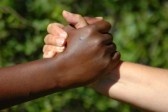Archive for the ‘Our Relationships’ Category
Safe Places
Posted on: December 13, 2007
Quite often White people feel uncomfortable when Black people or people of color, or the disabled, the disadvantaged, or anyone living outside the borders of the “mythical norm” proudly and publicly display their differences. I think it makes them feel excluded, unwanted, and unmissed.
I was again reminded of how this happens by the response I received from a fairly new friend of mine, a wonderfully engaging, artistically minded White woman. It seems after visiting In Other Words; my friend questioned whether or not the blog was a safe place in which to express herself. In my private response to her, I attempted to explain that my intention is not to make her feel *put off* or excluded.
One of my primary purposes for publishing this blog … a good 75 percent of my reasons are motivated by my sincere desire to provide a few Black women, as many as find me in the vastness of the Internet, a safe place. A safe place for a diverse group of intelligent, caring, strong, sensitive, proud women whose concerns, issues, and needs, I believe, are far too often ignored by the media, and by the public in general.
I don’t profess to be *the* voice … simply *a* voice among many.
I invited my friend to visit the blog suspecting that she might feel excluded, after all, she doesn’t know me that well. But I hoped at the same time that she would somehow be able to transcend her discomfort long enough to see what happens with the blog. I still hope she, and others who might feel initially *put off* will want to sit at the table I’ve set so we can talk not only about our differences, but about our similarities as well.

I suggested that she read an essay published in the 1980s’ by Peggy McIntosh, Ph.D., Senior Research Scientist and Associate Director, and associate director of the Wellesley Centers for Women. I was introduced to McIntosh’s ground breaking essay, “White Privilege: Unpacking the Invisible Knapsack,” in graduate school where I majored in Women’s Studies.
A quick Wikipedia search describes the essay as having set forth the concept of “white privilege,” a theoretical construct that has since significantly influenced anti-racist theory and practice as well as other activist movements.” Reading it certainly widened my perspective, and prompted me to contemplate how groups, other than White people, also consciously and unconsciously enjoy unearned class advantages.
The academic study of white privilege is now a fairly widely acknowledged source of legitimate research. A Google search reveals much more information than I am providing here.
Following is a brief excerpt of the essay. Follow the link in the essay title to read it in its entirety, which I hope you’ll take the time to do. If you do, come back and tell me what you think.
Florida’s Daughter
“I have met very few men who truly distressed about systemic, unearned male advantage and conferred dominance. And so one question for me and others like me is whether we will be like them, or whether we will get truly distressed, even outraged, about unearned race advantage and conferred dominance, and, if so, what we will do to lessen them. In any case, we need to do more work in identifying how they actually affect our daily lives. Many, perhaps most, of our white students in the United States think that racism doesn’t affect them because they are not people of color; they do not see “whiteness” as a racial identity. In addition, since race and sex are not the only advantaging systems at work, we need similarly to examine the daily experience of having age advantage, or ethnic advantage, or physical ability, or advantage related to nationality, religion, or sexual orientation….
“Disapproving of the system won’t be enough to change them. I was taught to think that racism could end if white individuals changed their attitude. But a “white” skin in the United States opens many doors for whites whether or not we approve of the way dominance has been conferred on us. Individual acts can palliate but cannot end, these problems.”
Peggy McIntosh, Ph.D.
Source: This excerpted essay is reprinted from the Winter 1990 issue of Independent School
I don’t know anything at all about this site, but as I’m writing this post, the host *Author/Entrepreneur Tionna Smalls* is leading a mixed gender discussion about Jay Z’s habit of walking in front of Beyonce.Tionna:
“I don’t care if you have body guards or not, take care of your girl first.”
Check out *Talk Dat Ish Radio*” a blog talk radio program that promotes itself as “the newest and hottest thing on the streets from Talk Dat Ish Entertainment.” They promise that if “you want the gossip, you want the opinion, then here it goes, let’s go and get it.”
You may not agree with everything you hear, but I think listening to a diversity of voices expands our awareness, and keeps us young in mind.
Check out what the East Coast is talkin’ about.
Florida’s Daughter